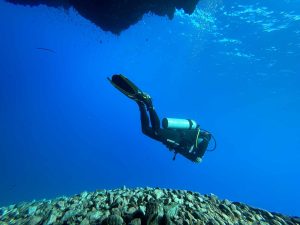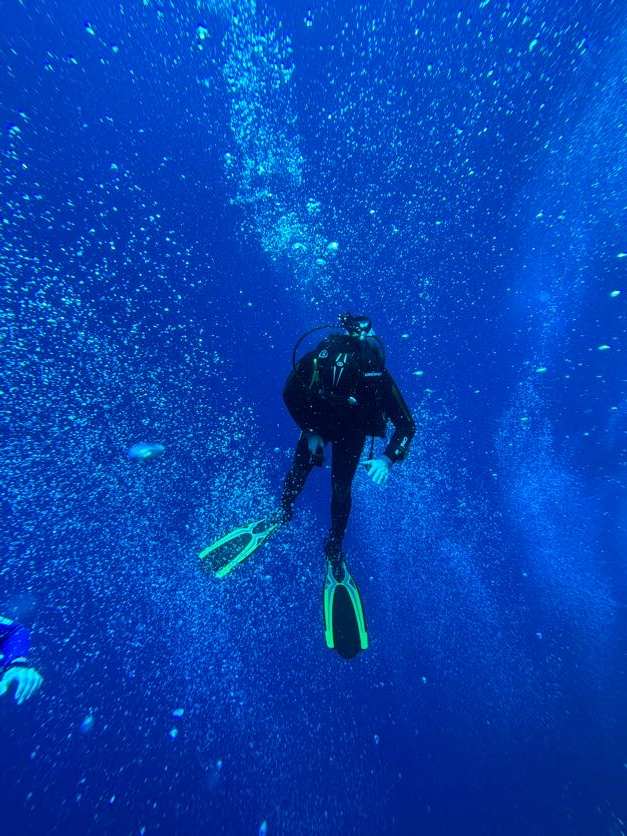Scuba diving, a physically active, adrenaline-filled and exhilarating activity that gives us access to an extraordinary underwater kingdom, often prompts the question of beginners, divers - "How deep can we go?" In this article, we will find out, together with the instructors of the diving club "Divings", in search of answers and delve into the area of depth limits, and learn what is a safe and responsible practice of scuba diving.

Table of Contents
Recreational diving, no deeper than 40 meters
For recreational divers, the depth limit that can be reached PADI DEEP DIVER courses, is usually 40 meters (130 feet). Carefully developed by renowned diving organizations such as PADI, SSI and NAUI, this standard is based on thorough scientific research and a deep understanding of safety considerations. The 40 meter limit in diving comes from two main factors:
- Decompression sickness (DCS): As divers ascend from deeper depths, the reduced pressure causes dissolved nitrogen in the bloodstream to form bubbles. If these bubbles are not properly managed, they can lead to decompression sickness (DCS), a potentially debilitating condition characterized by joint pain, skin rashes and neurological disorders.
- Nitrogen narcosis: At increased depth, the increased concentration of nitrogen in the diver's bloodstream can cause an altered state of consciousness called nitrogen narcosis. This condition is characterized by impaired judgment, euphoria and even hallucinations, which significantly compromises the diver's ability to make informed decisions and conduct safe diving practices.
Deeper than 40 meters is technical diving training for the fearless
For those who want to push the boundaries of depth exploration, deeper than 40 meters, technical diving emerges as a specialized deep diving discipline. Technical divers undergo rigorous training, FLOW DEEP courses and uses modern equipment to safely go beyond the limits of recreational diving. They use specialized gas mixtures such as trimix (oxygen, helium and nitrogen) to effectively manage decompression and reduce the effects of nitrogen narcosis.

Cooperation with diving experts, we learn the rules for visiting the depth
To further clarify the depth limits, let's delve into a question-and-answer session with experienced diving professionals from the underwater diving club "Divings":
Question: What factors affect a diver's maximum safe depth?
In addition to training and experience, a diver's individual characteristics such as age, fitness level and underlying health conditions play a key role in determining his maximum safe depth. In addition, the specific dive site, environmental factors and the nature of the dive plan also affect depth limits.
Question: Can I dive deeper while training?
While additional training undoubtedly improves a diver's skills and abilities, it does not automatically translate into exceeding the depth limit. Advanced Technical Diving Certificates, PADI TEC DEEP, provides the necessary knowledge and techniques to safely conduct deeper dives, but the underlying physiological limitations remain.
Question: What are the inherent risks associated with diving beyond 40 meters?
The risk of decompression sickness and nitrogen narcosis increases significantly with increasing depth. In addition, the complexity of technical diving equipment and procedures further increases the potential for errors and complications.
Question: How can we safely explore deeper depths without compromising safety?
A comprehensive understanding of the diving environment, careful planning and strict adherence to safety protocols are critical to deep diving. Technical diving courses equip divers with the necessary training and equipment management skills to effectively overcome these challenges.
Question: What are the ethical considerations when diving at extreme depths?
Responsible diving practices must prioritize environmental protection and minimize potential impact on the delicate underwater ecosystem. Divers must follow local regulations, avoid disturbing marine life and carefully dispose of all waste generated during diving.
A journey into the depths, together with knowledge
The depth limitations of scuba diving represent the necessary balance between human exploration and the preservation of underwater ecosystems. While the appeal of deeper diving is undeniable, it is imperative that these endeavors be approached with knowledge, experience and a deep respect for the marine environment. By understanding the physiological and environmental limitations, divers can embark on rewarding and responsible underwater adventures, ensuring that the wonders of the deep will be available for generations to come.
Independent diving practice, dive deep
We offer training and internships for divers and future divers Divemaster (GO-PRO - from beginner to PADI Divemaster). We organize diving trips, follow us >>>!
We prepare, train and certify divers, both Deep divers, DrySuit diver, though Full Face Mask Diver courses. We offer 30 different specializations in diving training and the issuance of international PADI scuba diving certificates.
We teach individual diving training courses (with the possibility of deep scuba diving) in Latvian, Russian and English in Riga and groups throughout Latvia (pre-registration required, tel./WhatsApp 220-77-202)

